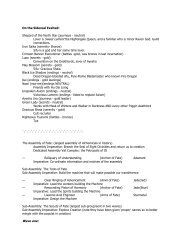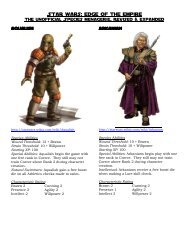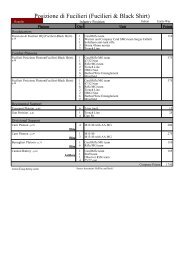13th Age - Foolz!
13th Age - Foolz!
13th Age - Foolz!
Create successful ePaper yourself
Turn your PDF publications into a flip-book with our unique Google optimized e-Paper software.
particularly bad way. But a failure isn’t always<br />
entirely terrible. . . .<br />
Fail Forward!<br />
A simple but powerful improvement you can<br />
make to your game is to redefine failure as<br />
“things go wrong” instead of “the PC isn’t good<br />
enough.” Ron Edwards, Luke Crane, and other<br />
indie RPG designers have championed this idea,<br />
and they’re exactly right. You can call it “fail<br />
forward” or “no whiffing.”<br />
The traditional way to interpret a failure is<br />
to see it as the character not being up to the task<br />
at hand. A low roll on the d20 implies some<br />
unexpectedly poor showing on the character's<br />
account. This interpretation is natural, and in<br />
practice we still use it quite often: occasionally<br />
we want failure to mean sheer failure and<br />
nothing but. That’s particularly true when<br />
characters are attempting skill rolls as part of a<br />
battle; when the rogue tries to be stealthy in the<br />
middle of a fight and fails we’re generally not<br />
failing them forward.<br />
But outside of battle, true failure tends to<br />
slow action down rather than move the action<br />
along. A more constructive way to interpret<br />
failure is as a near-success or event that happens<br />
to carry unwanted consequences or side effects.<br />
The character probably still fails to achieve the<br />
desired goal, but that’s because something<br />
happens on the way to the goal rather than<br />
because nothing happens.<br />
Suppose a player makes a Charisma check<br />
to have his or her rogue rustle up some clues as<br />
to where a certain monk of the black dragon<br />
might be hiding. The player fails the check.<br />
Traditionally, the GM would rule that the<br />
character had failed to find any information.<br />
With 13 th <strong>Age</strong>, we encourage you to rule that the<br />
character does indeed find clues as to the<br />
monk's location, but with unexpectedly bad<br />
results. Most likely, word has gotten to the<br />
monk that the rogue is looking for him, and he<br />
either escapes before his lair is found, or<br />
prepares for the group, either setting up an<br />
ambush or leaving a trap. The failure means that<br />
interesting things happen.<br />
Here’s an example from Jonathan’s<br />
campaign: Honeybottom, the ambiguously gendered<br />
halfling rogue who is way too friendly with the<br />
Prince of Shadows for her allies’ comfort, is sailing to<br />
Drakkenhall thanks to the Archmage’s artificially<br />
channeled winds thrusting the ship efficiently<br />
forward. As an accomplished mingler and agent,<br />
Honeybottom attempts to befriend and impress one of<br />
the ship’s officers. It’s a Charisma check using<br />
Honeybottom’s entertainer background. It’s not that<br />
hard a task, so it has DC 15, but Honeybottom rolls a<br />
4 and her level bonus, Charisma modifier, and points<br />
in entertainment don’t get her anywhere near 15.<br />
Used to the old way of interpreting failure, the player<br />
offers this interpretation: “I try to make small talk<br />
with him, but then I throw up a little on myself.”<br />
With “fail forward” as his mantra, Jonathan<br />
interprets the bad d20 roll quite differently. The<br />
suave PC does indeed make a good impression on the<br />
officer, but in private conversation the officer seems<br />
to be strongly hinting that he’s a recreational<br />
cannibal of some stripe. Honeybottom hasn’t exactly<br />
failed in winning the officer over, but she has failed in<br />
advancing her own agenda. If anything, the party’s<br />
prospects became a bit dimmer now that one of them<br />
has drawn the attention of a sociopath.<br />
Here’s another example from one of Rob’s<br />
games: Sir Gilly Tallfather makes an Intelligence<br />
check using his heraldry background to loudly<br />
proclaim the likely result of the upcoming game of<br />
Cricket, a complex halfling sport in which two<br />
trained crickets alternately sing beautiful songs<br />
together or tear off each other’s legs in gladiatorial<br />
combat. Gilly fails badly, but instead of making the<br />
wrong prediction, he correctly calls the result of the<br />
match, while costing a gang of gnome toughs who<br />
were controlling the betting a hefty chunk of change.<br />
Rob didn’t know the toughs were involved in the<br />
match UNTIL Gilly failed.<br />
And one final example that almost<br />
happened in Rob’s campaign but the action<br />
went elsewhere: The party is climbing a set of cliffs<br />
to stage an ambush on agents of the Diabolist<br />
traveling in hot-air balloons kept aloft by demons.<br />
The Strength and Dexterity checks using various<br />
relevant backgrounds don’t go very well, but ruling<br />
that the characters can’t climb any further or that<br />
© 2012 Fire Opal Media. All rights reserved. 50







